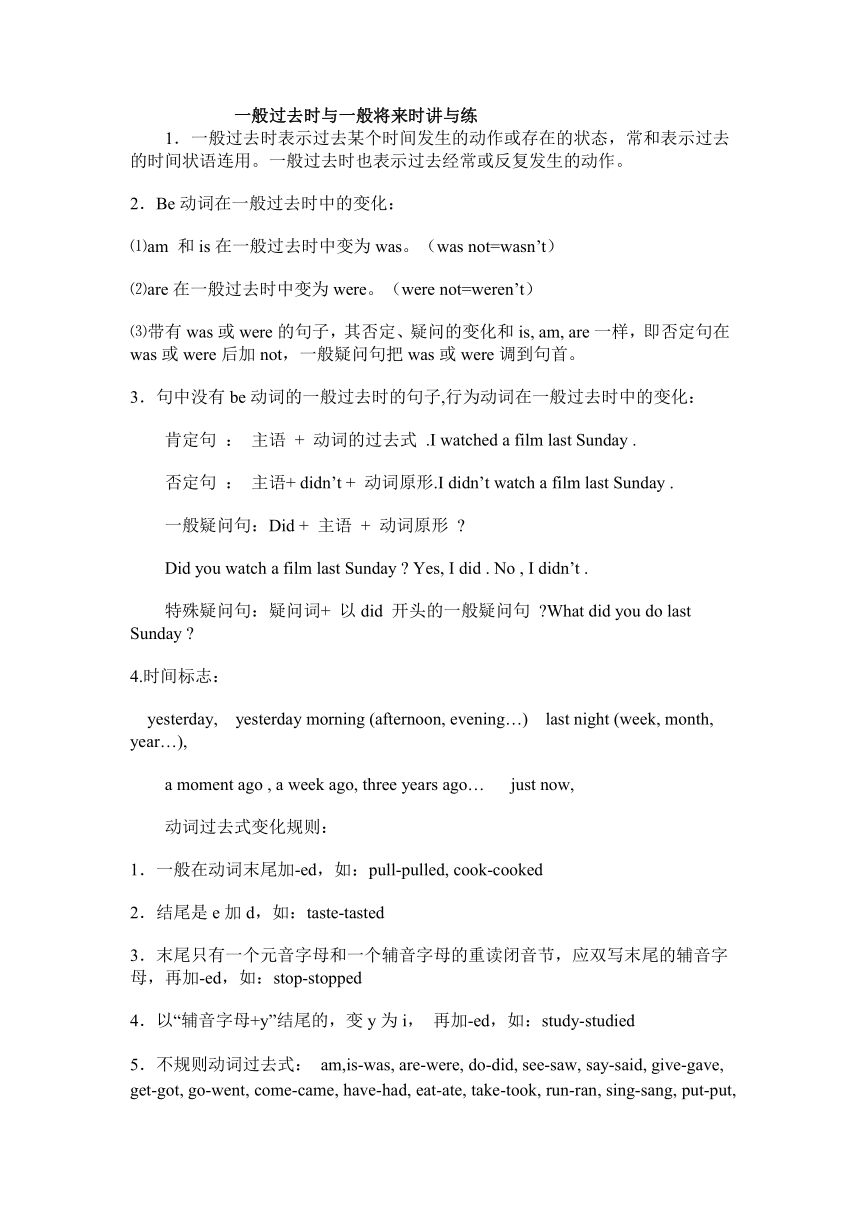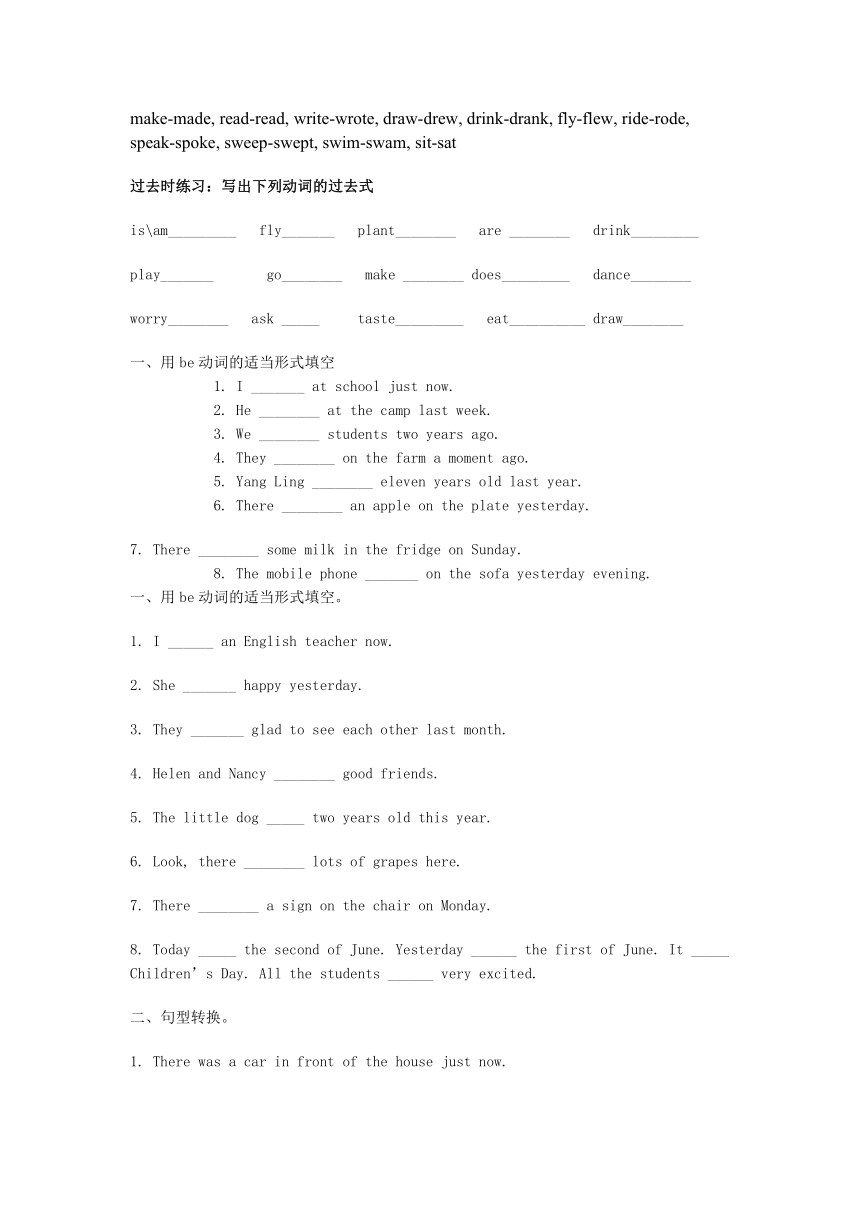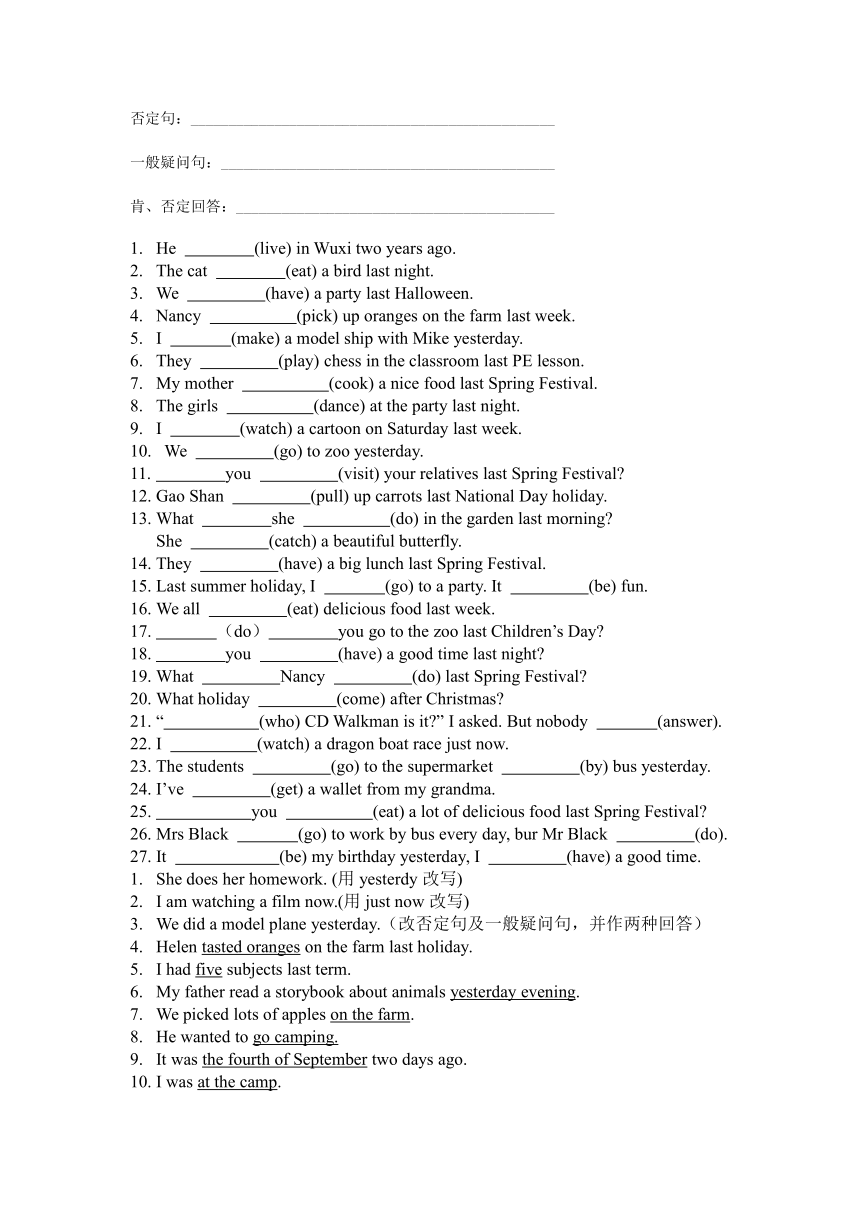小学英语一般过去时与一般将来时讲与练
文档属性
| 名称 | 小学英语一般过去时与一般将来时讲与练 |

|
|
| 格式 | zip | ||
| 文件大小 | 9.6KB | ||
| 资源类型 | 教案 | ||
| 版本资源 | 人教版(PEP) | ||
| 科目 | 英语 | ||
| 更新时间 | 2011-08-03 00:00:00 | ||
图片预览



文档简介
一般过去时与一般将来时讲与练
1.一般过去时表示过去某个时间发生的动作或存在的状态,常和表示过去的时间状语连用。一般过去时也表示过去经常或反复发生的动作。
2.Be动词在一般过去时中的变化:
⑴am 和is在一般过去时中变为was。(was not=wasn’t)
⑵are在一般过去时中变为were。(were not=weren’t)
⑶带有was或were的句子,其否定、疑问的变化和is, am, are一样,即否定句在was或were后加not,一般疑问句把was或were调到句首。
句中没有be动词的一般过去时的句子,行为动词在一般过去时中的变化:
肯定句 : 主语 + 动词的过去式 .I watched a film last Sunday .
否定句 : 主语+ didn’t + 动词原形.I didn’t watch a film last Sunday .
一般疑问句:Did + 主语 + 动词原形
Did you watch a film last Sunday Yes, I did . No , I didn’t .
特殊疑问句:疑问词+ 以did 开头的一般疑问句 What did you do last Sunday
4.时间标志:
yesterday, yesterday morning (afternoon, evening…) last night (week, month, year…),
a moment ago , a week ago, three years ago… just now,
动词过去式变化规则:
1.一般在动词末尾加-ed,如:pull-pulled, cook-cooked
2.结尾是e加d,如:taste-tasted
3.末尾只有一个元音字母和一个辅音字母的重读闭音节,应双写末尾的辅音字母,再加-ed,如:stop-stopped
4.以“辅音字母+y”结尾的,变y为i, 再加-ed,如:study-studied
5.不规则动词过去式: am,is-was, are-were, do-did, see-saw, say-said, give-gave, get-got, go-went, come-came, have-had, eat-ate, take-took, run-ran, sing-sang, put-put, make-made, read-read, write-wrote, draw-drew, drink-drank, fly-flew, ride-rode, speak-spoke, sweep-swept, swim-swam, sit-sat
过去时练习:写出下列动词的过去式
is\am_________ fly_______ plant________ are ________ drink_________
play_______ go________ make ________ does_________ dance________
worry________ ask _____ taste_________ eat__________ draw________
一、用be动词的适当形式填空
1. I _______ at school just now.
2. He ________ at the camp last week.
3. We ________ students two years ago.
4. They ________ on the farm a moment ago.
5. Yang Ling ________ eleven years old last year.
6. There ________ an apple on the plate yesterday.
7. There ________ some milk in the fridge on Sunday.
8. The mobile phone _______ on the sofa yesterday evening.
一、用be动词的适当形式填空。
1. I ______ an English teacher now.
2. She _______ happy yesterday.
3. They _______ glad to see each other last month.
4. Helen and Nancy ________ good friends.
5. The little dog _____ two years old this year.
6. Look, there ________ lots of grapes here.
7. There ________ a sign on the chair on Monday.
8. Today _____ the second of June. Yesterday ______ the first of June. It _____ Children’s Day. All the students ______ very excited.
二、句型转换。
1. There was a car in front of the house just now.
否定句:________________________________________________
一般疑问句:____________________________________________
肯、否定回答:__________________________________________
He (live) in Wuxi two years ago.
The cat (eat) a bird last night.
We (have) a party last Halloween.
Nancy (pick) up oranges on the farm last week.
I (make) a model ship with Mike yesterday.
They (play) chess in the classroom last PE lesson.
My mother (cook) a nice food last Spring Festival.
The girls (dance) at the party last night.
I (watch) a cartoon on Saturday last week.
We (go) to zoo yesterday.
you (visit) your relatives last Spring Festival
Gao Shan (pull) up carrots last National Day holiday.
What she (do) in the garden last morning
She (catch) a beautiful butterfly.
They (have) a big lunch last Spring Festival.
Last summer holiday, I (go) to a party. It (be) fun.
We all (eat) delicious food last week.
(do) you go to the zoo last Children’s Day
you (have) a good time last night
What Nancy (do) last Spring Festival
What holiday (come) after Christmas
“ (who) CD Walkman is it ” I asked. But nobody (answer).
I (watch) a dragon boat race just now.
The students (go) to the supermarket (by) bus yesterday.
I’ve (get) a wallet from my grandma.
you (eat) a lot of delicious food last Spring Festival
Mrs Black (go) to work by bus every day, bur Mr Black (do).
It (be) my birthday yesterday, I (have) a good time.
She does her homework. (用yesterdy改写)
I am watching a film now.(用just now改写)
We did a model plane yesterday.(改否定句及一般疑问句,并作两种回答)
Helen tasted oranges on the farm last holiday.
I had five subjects last term.
My father read a storybook about animals yesterday evening.
We picked lots of apples on the farm.
He wanted to go camping.
It was the fourth of September two days ago.
I was at the camp.
There were 30 apple trees(1) on the farm(2).(3)
He asked her to clean the bedroom.
They went to the cinema on Sunday.
二.将来时
一、概念:表示将要发生的动作或存在的状态及打算、计划或预备做某事。句中一般有以下时间状语:tomorrow, next day(week, month, year…),soon, the day after tomorrow(后天)等。
二. 构成及变化:一般将来时常用的两种结构
be going to+动词原形 : 表示打算、准备做的事或即将发生或肯定要发生的事。
shall/will+动词原形 : 表示将要发生的动作或情况,没有太多的计划性, 还用来表示意愿
1. be going to +动词原形
1.肯定句 主语+be(am /,is,/ are) going to +动词原形+其它成份
My sister is going to learn English next year. 我姐姐准备明年学英语。
2.否定句 主语+be(am / is / are)not going to +动词原形 +其它成份
I am not going to(go to)the cinema tonight. 我今天晚上不打算去看电影。
3.一般疑问句 Be (am / is / are)+主语+going to+动词原型+其它成份…
Is your father going to play basketball with you No , he isn’t.你父亲打算和你去打篮球吗 不。
4.特殊疑问句 特殊疑问词(Wh-)+一般疑问句
Where are you going to spend Spring Fesital. 春节你打算在哪过
5.注意: be going to 结构后面习惯上不跟 go , come 等表位移的动词,一般用该动词的进行时形式表示。如: He’s going to New York next week.下周他要去纽约.
2.will /shall +动词原形 (在书面语中,主语是第一人称时,常用shall ,在口语中,所有人称都可以用will)
1.肯定句 主语+will/shall+动词原形+其它成份
I (shall) write to him next week. 下周我将给他写信。
2.否定句 主语 + will /shall+ not + 动词原形 +其它成份
They won’t watch TV this evening.今天晚上他们不看电视。
3.一般疑问句 will/shall+主语 +动词原形+其它成份
Will you stay at home with us tomorrow 明天你和我们呆在家里好吗
4.特殊疑问句 特殊疑问词(Wh-) +一般疑问句
When will your father be back 你爸爸什么时侯回来
三、附 :Shall I /we …常用来征求对方意见,而问对方是否愿意,或者表示客气的邀请,常用Will you… 他们的回答比较灵活。
1.Shall we go to the park
肯定Sure , let’s go . 否定 No , let’s go to the cinema.
2.Will you please come to my birthday party next week
肯定Yes, I will. / Sure . 否定 I’m sorry. I’m afraid I can’t.
四、时间标志:tomorrow , soon , next Monday , next year , next weekend , this afternoon , this evening ……
练习:填空。
1. 我打算明天和朋友去野炊。
I_____ _______ _________ have a picnic with my friends.
I ________ have a picnic with my friends.
2. 下个星期一你打算去干嘛 我想去打篮球。
What ________ ________ _________ _________ _________ next Monday
I _______ ______ _____ play basketball. What _________ you do next Monday
I ________ play basketball.
3. 你妈妈这个周末去购物吗?是,她要去买一些水果。
_____ your mother _______ ________ go shopping this ___________ Yes, she _________. She ______ ________ __________ buy some fruit.
4. 你们打算什么时候见面。
What time _______ you _________ __________ meet
改句子。
5. Nancy is going to go camping.(改否定)
Nancy ________ going to go camping.
6. I’ll go and join them.(改否定)
I _______ go ______ join them.
7. I’m going to get up at 6:30 tomorrow.(改一般疑问句)
________ _______ ________ to get up at 6:30 tomorrow
8. We will meet at the bus stop at 10:30.(改一般疑问句)
_______ ________ meet at the bus stop at 10:30.
9. She is going to listen to music after school.(对划线部分提问)
________ _______ she ________ ________ _________ after school
10. My father and mother are going to see a play the day after tomorrow.(同上) _________ _________ going to see a play the day after tomorrow.
用所给词的适当形式填空。
11. Today is a sunny day. We ___________________ (have) a picnic this afternoon.
12. My brother _______________ (go) to Shanghai next week.
13. Tom often ______________(go) to school on foot. But today is rain. He ______________ (go) to school by bike.
14. What do you usually do at weekends I usually ________ (watch) TV and ________(catch) insects
15. It’s Friday today. What _____she _________ (do) this weekend She ______________ (watch) TV and _____________ (catch) insects.
16. What ___________ (d0) you do last Sunday I ____________ (pick) apples on a farm.
What ______________ (do) next Sunday I ______________ (milk) cows.
17. Mary ____________ (visit) her grandparents tomorrow.
18. Liu Tao ____________ (fly) kites in the playground yesterday.
19. David ______________ (give) a puppet show next Monday.
20. I ________________ (plan) for my stud
1.一般过去时表示过去某个时间发生的动作或存在的状态,常和表示过去的时间状语连用。一般过去时也表示过去经常或反复发生的动作。
2.Be动词在一般过去时中的变化:
⑴am 和is在一般过去时中变为was。(was not=wasn’t)
⑵are在一般过去时中变为were。(were not=weren’t)
⑶带有was或were的句子,其否定、疑问的变化和is, am, are一样,即否定句在was或were后加not,一般疑问句把was或were调到句首。
句中没有be动词的一般过去时的句子,行为动词在一般过去时中的变化:
肯定句 : 主语 + 动词的过去式 .I watched a film last Sunday .
否定句 : 主语+ didn’t + 动词原形.I didn’t watch a film last Sunday .
一般疑问句:Did + 主语 + 动词原形
Did you watch a film last Sunday Yes, I did . No , I didn’t .
特殊疑问句:疑问词+ 以did 开头的一般疑问句 What did you do last Sunday
4.时间标志:
yesterday, yesterday morning (afternoon, evening…) last night (week, month, year…),
a moment ago , a week ago, three years ago… just now,
动词过去式变化规则:
1.一般在动词末尾加-ed,如:pull-pulled, cook-cooked
2.结尾是e加d,如:taste-tasted
3.末尾只有一个元音字母和一个辅音字母的重读闭音节,应双写末尾的辅音字母,再加-ed,如:stop-stopped
4.以“辅音字母+y”结尾的,变y为i, 再加-ed,如:study-studied
5.不规则动词过去式: am,is-was, are-were, do-did, see-saw, say-said, give-gave, get-got, go-went, come-came, have-had, eat-ate, take-took, run-ran, sing-sang, put-put, make-made, read-read, write-wrote, draw-drew, drink-drank, fly-flew, ride-rode, speak-spoke, sweep-swept, swim-swam, sit-sat
过去时练习:写出下列动词的过去式
is\am_________ fly_______ plant________ are ________ drink_________
play_______ go________ make ________ does_________ dance________
worry________ ask _____ taste_________ eat__________ draw________
一、用be动词的适当形式填空
1. I _______ at school just now.
2. He ________ at the camp last week.
3. We ________ students two years ago.
4. They ________ on the farm a moment ago.
5. Yang Ling ________ eleven years old last year.
6. There ________ an apple on the plate yesterday.
7. There ________ some milk in the fridge on Sunday.
8. The mobile phone _______ on the sofa yesterday evening.
一、用be动词的适当形式填空。
1. I ______ an English teacher now.
2. She _______ happy yesterday.
3. They _______ glad to see each other last month.
4. Helen and Nancy ________ good friends.
5. The little dog _____ two years old this year.
6. Look, there ________ lots of grapes here.
7. There ________ a sign on the chair on Monday.
8. Today _____ the second of June. Yesterday ______ the first of June. It _____ Children’s Day. All the students ______ very excited.
二、句型转换。
1. There was a car in front of the house just now.
否定句:________________________________________________
一般疑问句:____________________________________________
肯、否定回答:__________________________________________
He (live) in Wuxi two years ago.
The cat (eat) a bird last night.
We (have) a party last Halloween.
Nancy (pick) up oranges on the farm last week.
I (make) a model ship with Mike yesterday.
They (play) chess in the classroom last PE lesson.
My mother (cook) a nice food last Spring Festival.
The girls (dance) at the party last night.
I (watch) a cartoon on Saturday last week.
We (go) to zoo yesterday.
you (visit) your relatives last Spring Festival
Gao Shan (pull) up carrots last National Day holiday.
What she (do) in the garden last morning
She (catch) a beautiful butterfly.
They (have) a big lunch last Spring Festival.
Last summer holiday, I (go) to a party. It (be) fun.
We all (eat) delicious food last week.
(do) you go to the zoo last Children’s Day
you (have) a good time last night
What Nancy (do) last Spring Festival
What holiday (come) after Christmas
“ (who) CD Walkman is it ” I asked. But nobody (answer).
I (watch) a dragon boat race just now.
The students (go) to the supermarket (by) bus yesterday.
I’ve (get) a wallet from my grandma.
you (eat) a lot of delicious food last Spring Festival
Mrs Black (go) to work by bus every day, bur Mr Black (do).
It (be) my birthday yesterday, I (have) a good time.
She does her homework. (用yesterdy改写)
I am watching a film now.(用just now改写)
We did a model plane yesterday.(改否定句及一般疑问句,并作两种回答)
Helen tasted oranges on the farm last holiday.
I had five subjects last term.
My father read a storybook about animals yesterday evening.
We picked lots of apples on the farm.
He wanted to go camping.
It was the fourth of September two days ago.
I was at the camp.
There were 30 apple trees(1) on the farm(2).(3)
He asked her to clean the bedroom.
They went to the cinema on Sunday.
二.将来时
一、概念:表示将要发生的动作或存在的状态及打算、计划或预备做某事。句中一般有以下时间状语:tomorrow, next day(week, month, year…),soon, the day after tomorrow(后天)等。
二. 构成及变化:一般将来时常用的两种结构
be going to+动词原形 : 表示打算、准备做的事或即将发生或肯定要发生的事。
shall/will+动词原形 : 表示将要发生的动作或情况,没有太多的计划性, 还用来表示意愿
1. be going to +动词原形
1.肯定句 主语+be(am /,is,/ are) going to +动词原形+其它成份
My sister is going to learn English next year. 我姐姐准备明年学英语。
2.否定句 主语+be(am / is / are)not going to +动词原形 +其它成份
I am not going to(go to)the cinema tonight. 我今天晚上不打算去看电影。
3.一般疑问句 Be (am / is / are)+主语+going to+动词原型+其它成份…
Is your father going to play basketball with you No , he isn’t.你父亲打算和你去打篮球吗 不。
4.特殊疑问句 特殊疑问词(Wh-)+一般疑问句
Where are you going to spend Spring Fesital. 春节你打算在哪过
5.注意: be going to 结构后面习惯上不跟 go , come 等表位移的动词,一般用该动词的进行时形式表示。如: He’s going to New York next week.下周他要去纽约.
2.will /shall +动词原形 (在书面语中,主语是第一人称时,常用shall ,在口语中,所有人称都可以用will)
1.肯定句 主语+will/shall+动词原形+其它成份
I (shall) write to him next week. 下周我将给他写信。
2.否定句 主语 + will /shall+ not + 动词原形 +其它成份
They won’t watch TV this evening.今天晚上他们不看电视。
3.一般疑问句 will/shall+主语 +动词原形+其它成份
Will you stay at home with us tomorrow 明天你和我们呆在家里好吗
4.特殊疑问句 特殊疑问词(Wh-) +一般疑问句
When will your father be back 你爸爸什么时侯回来
三、附 :Shall I /we …常用来征求对方意见,而问对方是否愿意,或者表示客气的邀请,常用Will you… 他们的回答比较灵活。
1.Shall we go to the park
肯定Sure , let’s go . 否定 No , let’s go to the cinema.
2.Will you please come to my birthday party next week
肯定Yes, I will. / Sure . 否定 I’m sorry. I’m afraid I can’t.
四、时间标志:tomorrow , soon , next Monday , next year , next weekend , this afternoon , this evening ……
练习:填空。
1. 我打算明天和朋友去野炊。
I_____ _______ _________ have a picnic with my friends.
I ________ have a picnic with my friends.
2. 下个星期一你打算去干嘛 我想去打篮球。
What ________ ________ _________ _________ _________ next Monday
I _______ ______ _____ play basketball. What _________ you do next Monday
I ________ play basketball.
3. 你妈妈这个周末去购物吗?是,她要去买一些水果。
_____ your mother _______ ________ go shopping this ___________ Yes, she _________. She ______ ________ __________ buy some fruit.
4. 你们打算什么时候见面。
What time _______ you _________ __________ meet
改句子。
5. Nancy is going to go camping.(改否定)
Nancy ________ going to go camping.
6. I’ll go and join them.(改否定)
I _______ go ______ join them.
7. I’m going to get up at 6:30 tomorrow.(改一般疑问句)
________ _______ ________ to get up at 6:30 tomorrow
8. We will meet at the bus stop at 10:30.(改一般疑问句)
_______ ________ meet at the bus stop at 10:30.
9. She is going to listen to music after school.(对划线部分提问)
________ _______ she ________ ________ _________ after school
10. My father and mother are going to see a play the day after tomorrow.(同上) _________ _________ going to see a play the day after tomorrow.
用所给词的适当形式填空。
11. Today is a sunny day. We ___________________ (have) a picnic this afternoon.
12. My brother _______________ (go) to Shanghai next week.
13. Tom often ______________(go) to school on foot. But today is rain. He ______________ (go) to school by bike.
14. What do you usually do at weekends I usually ________ (watch) TV and ________(catch) insects
15. It’s Friday today. What _____she _________ (do) this weekend She ______________ (watch) TV and _____________ (catch) insects.
16. What ___________ (d0) you do last Sunday I ____________ (pick) apples on a farm.
What ______________ (do) next Sunday I ______________ (milk) cows.
17. Mary ____________ (visit) her grandparents tomorrow.
18. Liu Tao ____________ (fly) kites in the playground yesterday.
19. David ______________ (give) a puppet show next Monday.
20. I ________________ (plan) for my stud
